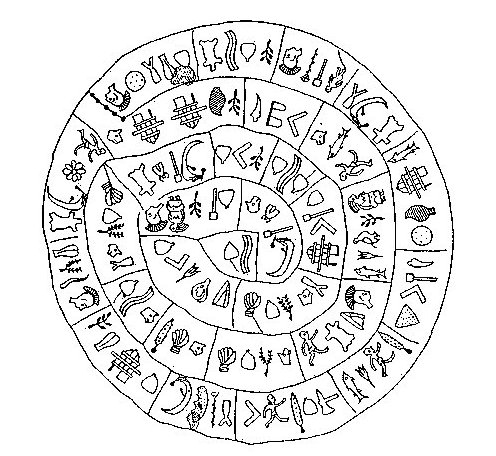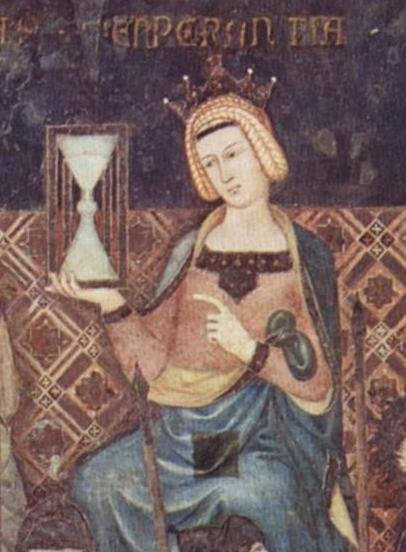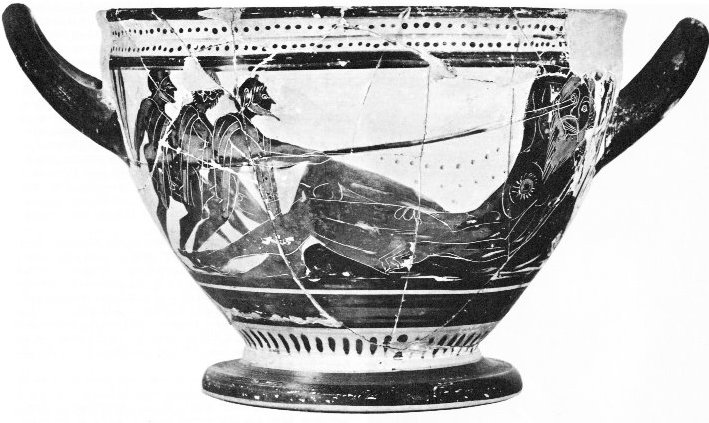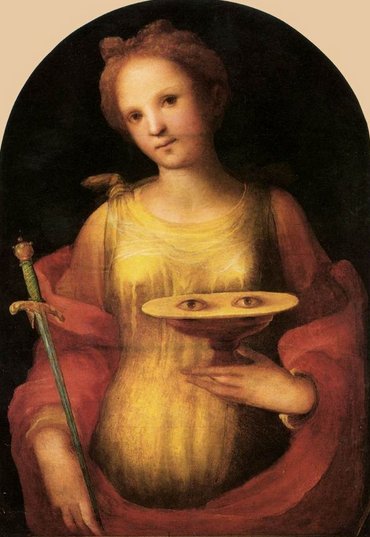|
THE D TABLET
Once again. The bottom side of the Phaistos Disc carries 118 glyphs (→ 4 synodic lunar months) and I have suggested its center could be occupied by the Breast of Cassiopeia (the star Schedir in the night) together with the stream of her milk forming the Milky Way river:
But as Schedir was at right ascension day *8 (according to my assumed era for rongorongo) it suggests we should count 8 + 118 = 126 (→ 2 * 63), in which case the total number for the disc might have been thought of as 8 + 118 (bottom) + 123 (top) = 249 → *249 for heliacal Antares.
In the D text we can see that presumably the first 8 days were beginning with heliacal Ain (*65), which in contrast to the G text was to be regarded as day zero:
... Time flows and not until its first measure has been completed in full can there be 1 notched into the wood ...
We should remember that our Christian time structure has no year zero; instead the first Anno Domini (AD) year was preceded by the last Before Christ (BC) year.
There was a kind of mirror in the center - in high summer at the trunk of the Tree - and growth was beginning from the root at the bottom and ending high up with the 8 petals of the flower. Life begins at bottom as is documented on the rongorongo tablets. ... What might lie behind this statement is revealed by a contemporary Mopán Maya tale in which Lord K'in (the sun) goes from his home in the east to the center of the sky and then back to the east again; it appears that he goes clear across the sky because he has placed a mirror at its center. To interpret the movements of the sun in this manner is to model it on Venus as morning star, which both rises and sets in the east ... ... But the time of his predestined defeat by the dark brother, Tezcatlipoca, was ever approaching, and, knowing perfectly the rhythm of his own destiny, Quetzalcoatl would make no move to stay it. Tezcatlipoca, therefore, said to his attendants, 'We shall give him a drink to dull his reason and show him his own face in a mirror; then, surely, he will be lost'. And he said to the servants of the good king, 'Go tell your master that I have come to show him his own flesh!' But when the message was brought to Quetzalcoatl, the aging monarch said, 'What does he call my own flesh? Go and ask!' And when the other was admitted to his presence: 'What is this, my flesh, that you would show me?' Tezcatlipoca answered, 'My Lord and Priest, look now at your flesh; know yourself; see yourself as you are seen by others!' And he presented the mirror. Whereupon, seeing his own face in that mirror, Quetzalcoatl immediately cried out, 'How is it possible that my subjects should look upon me without fright? Well might they flee from before me. For how can a man remain among them when he is filled as I am with foul sores, his old face wrinkled and of an aspect so loathsome? I shall be seen no more, I shall no longer terrify my people'. Presented the drink to quaff, he refused it, saying that he was ill; but urged to taste it from the tip of his finger, he did so and was immediately overpowered by its magic. He lifted the bowl and was drunk. He sent for Quetzalpetlatl, his sister, who dwelt on the Mountain Nonoalco. She came, and her brother gave her the bowl, so that she too was drunk. And with all reason forgotten, the two that night neither said prayers nor went to the bath, but sank asleep together on the floor ... And 8 + reversed 8 = 16 could then have been intended to show the necessity of adding 16 days when considering the ancient times when they waited for the return to visibility. 84 (Julian equinox) + 16 = 100. Maybe we should think of number 88 as a reflection of the idea of 8 + mirrored 8. 80 + *88 (Betelgeuze at the brink of the Milky Way River) = 168 (June 17) = 336 / 2. Or better: 84 + *88 = 172 (Solstice). ... So the shift in the date of the equinox that occurred between the 4th and the 16th centuries was annulled with the Gregorian calendar, but nothing was done for the first four centuries of the Julian calendar. The days of 29 February of the years AD 100, AD 200, AD 300, and the day created by the irregular application of leap years between the assassination of Caesar and the decree of Augustus re-arranging the calendar in AD 8, remained in effect. This moved the equinox four days earlier than in Caesar's time ... 88 = 22 * 4 (where 22 should be understood as number π and thus 88 should be equivalent to 4 * 314 = 2 * 628): ... About Carmenta we know from the historian Dionysus Periergetis that she gave orcales to Hercules and lived to the age of 110 years. 110 was a canonical number, the ideal age which every Egyptian wished to reach and the age at which, for example, the patriarch Joseph died. The 110 years were made up of twenty-two Etruscan lustra of five years each; and 110 years composed the 'cycle' taken over from the Etruscans by the Romans. At the end of each cycle they corrected irregularities in the solar calendar by intercalation and held Secular Games. The secret sense of 22 - sacred numbers were never chosen haphazardly - is that it is the measure of the circumference of the circle when the diameter is 7. This proportion, now known as pi, is no longer a religious secret; and is used today only as a rule-of-thumb formula, the real mathematical value of pi being a decimal figure which nobody has yet been able work out because it goes on without ever ending, as 22 / 7 does, in a neat recurring sequence [3.142857142857 ...]. Seven lustra add up to thirty-five years, and thirty-five at Rome was the age at which a man was held to reach his prime and might be elected Consul ... ... Odysseus and his fleet were now in a mythic realm of difficult trials and passages, of which the first was to be the Land of the Cyclopes, 'neither nigh at hand, nor yet afar off', where the one-eyed giant Polyphemus, son of the god Poseidon (who, as we know, was the lord of tides and of the Two Queens, and the lord, furthermore, of Medusa), dwelt with his flocks in a cave. 'Yes, for he was a monstrous thing and fashioned marvelously, nor was he like to any man that lives by bread, but like a wooded peak of the towering hills, which stands out apart and alone from others.' Odysseus, choosing twelve men, the best of the company, left his ships at shore and sallied to the vast cave. It was found stocked abundantly with cheeses, flocks of lambs and kids penned apart, milk pails, bowls of whey; and when the company had entered and was sitting to wait, expecting hospitality, the owner came in, shepherding his flocks. He bore a grievous weight of dry wood, which he cast down with a din inside the cave, so that in fear all fled to hide. Lifting a huge doorstone, such as two and twenty good four-wheeled wains could not have raised from the ground, he set this against the mouth of the cave, sat down, milked his ewes and goats, and beneath each placed her young, after which he kindled a fire and spied his guests ...
628 (2 * 314) - 168 (2 * 84) = 460 (2 * 230).
|
||||||||||||||||||||||||||||||||||||||||||||||||||||||||||||||||||||||||||||||||||||||||||||||||||||||||||||||||||||||||||||||||||||||||||||||||||||||||||||||||||||||||||||||||||||||||||||||||||||||||||||||||||||||||||||||||||||||||||||||||||||||||||||||||||||||||||||||||||||||||||||||||||||||||||||||||||||||||||||||||||||||||||||||||||||

















.jpg)